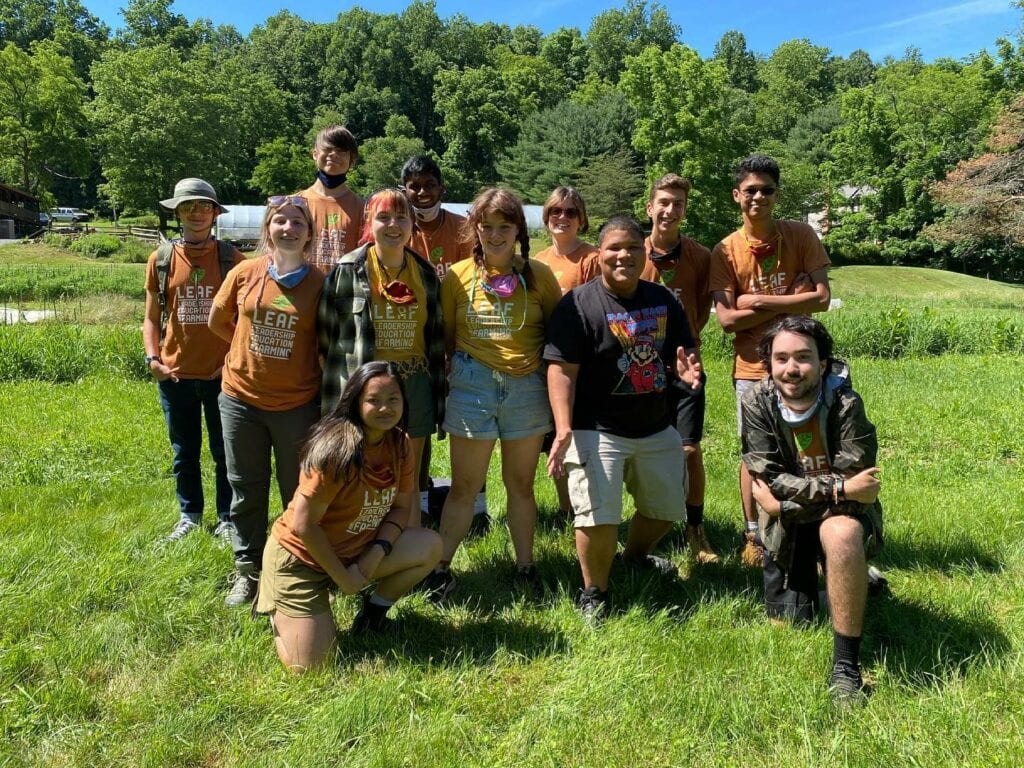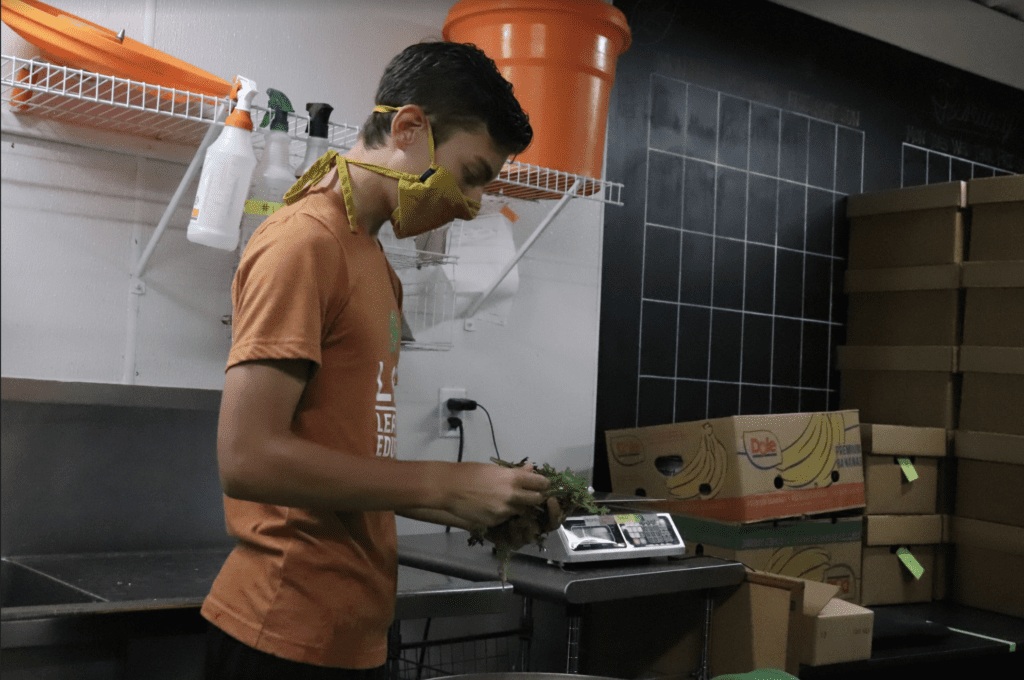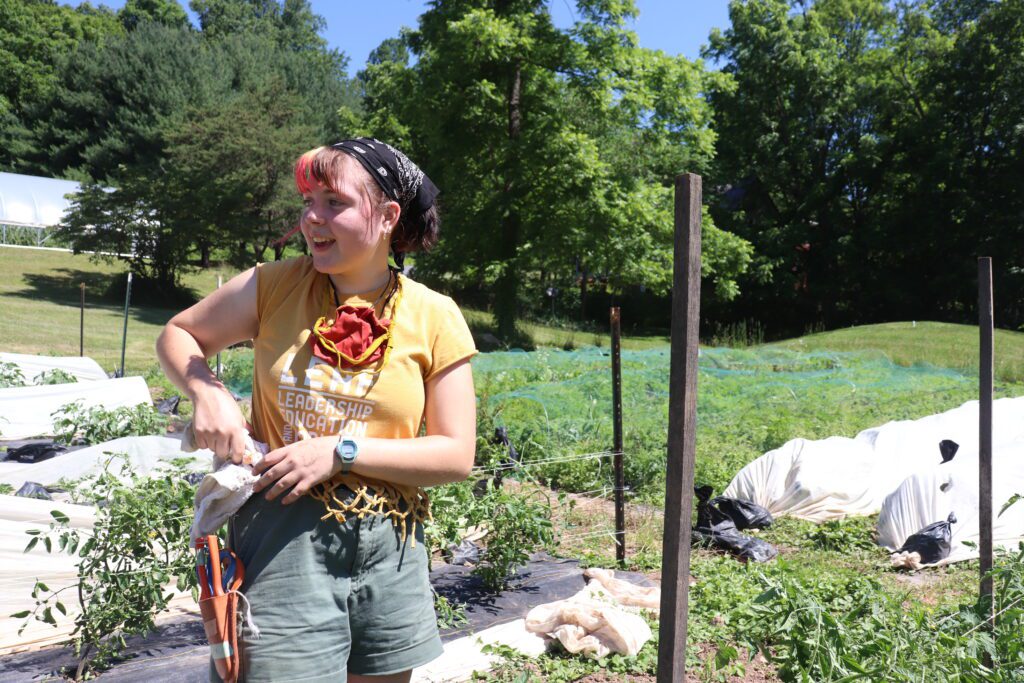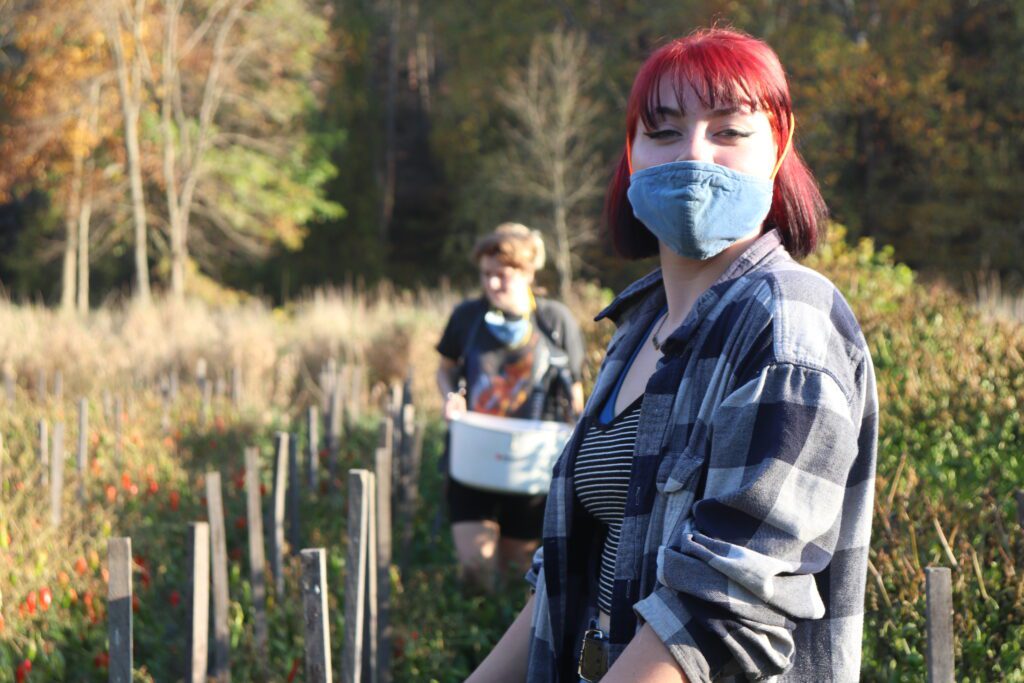The LEAF Project is one of two host sites piloting our new Diversified Vegetable Pre-Apprenticeship, which provides introductory hands-on training for people who want to explore sustainable vegetable farming as a career but have little to no prior farming experience. After completing the program, a pre-apprentice will have gained the baseline experience needed to seamlessly transition into our intensive two-year vegetable farming apprenticeship.
In this blog post, LEAF Founder and Executive Director Heidi Witmer explains how hosting our pre-apprenticeship program complements LEAF’s work engaging youth leaders in the food system. Heidi is also a Pasa board member.

We asked Heidi where the idea for the LEAF (Leadership Education and Farming) Project came from, and she pointed to several seeds of inspiration. When she started a market garden side business after college, she drew on her childhood experience helping on family farms with production and canning, and she had her extended family as farming mentors. “I was lucky to grow up very connected to our regional food system,” she said. “With LEAF, I wanted to help make entry points into the food system for kids who grow up outside of farming families.”
It was when she was working at a school in Harrisburg, Pennsylvania that Heidi recognized a problem that was really an opportunity. “There was a lot of research at the time about ‘summer learning loss.’ But I felt like rather than talking about what students were losing, we should be imagining different kinds of experiences they could be gaining over the summer break.” She gave her students an assignment to find summer jobs or volunteer positions, but at the time (late 2000s, early 2010s) youth employment was at a record low. Heidi said, “My students were coming back with 20 plus rejection letters. I realized it wasn’t the world I had grown up in, where everyone could have a summer job. There was a critical need for youth engagement and employment.”
“If you don’t grow up on a farm, you can just drive by corn fields all your life and you have no idea the work that goes into it. There’s a profound disconnect.”
Heidi saw an opportunity to connect the vibrant agricultural sector she grew up in with an untapped resource — youth employees — to meet some of our region’s most pressing challenges: food insecurity, a rise in food-choice-related health challenges, and workforce development. She imagined LEAF as a way to help students discover their strengths, grow their leadership skills, and gain experience that would help them qualify for any job or entrepreneurial endeavor they want to try next. She also hoped that many of them would begin to see themselves as part of the food system. “If you don’t grow up on a farm, you can just drive by corn fields all your life and you have no idea the work that goes into it. There’s a profound disconnect.”
LEAF works to grow that connection by cultivating youth leaders from diverse backgrounds through meaningful work in the food system. Students ages 14–18 can participate in up to four years of paid positions, beginning with introductory work, then progressing to specialized roles and taking on leadership responsibilities.

The LEAF farm is located on the same land in Perry County, Pennsylvania where Heidi started her market garden. “It’s a relatively small farm, but it’s become a much bigger enterprise than when I was running it solo,” she said. Students operate one-and-a-half acres of production fields and tunnels, and distribute 100 weekly summer farm shares to community members. They also sell at regional farmers markets, manage wholesale accounts with local restaurants, and donate to hunger relief organizations. LEAF additionally runs its own commercial kitchen that specializes in preserved and value-added products.
“The young people here are doing every piece of this farming business puzzle. Not just in the field and in the kitchen,” said Heidi. “They’re doing profit analysis, marketing, assessing our strengths, finding where the gaps are, and asking bigger picture questions, like ‘what does food system equity look like in our region?’”
LEAF also partners with many local for-profit farms to give students a chance to experience different types and scales of production as well as to meet food system role models. To Heidi, these partnerships are the backbone of LEAF: “Our students are at a really pivotal point. They’re starting to make decisions about the direction their lives will take and asking ‘what do I want to do for a career’? So it’s wonderful for them to be meeting farmers and other food system leaders who are making a difference in their communities.”

Of the 25 students participating in LEAF this season, nine are enrolled in our Diversified Vegetable Pre-Apprenticeship.
Heidi says, “We’re so excited to add the Pre-Apprenticeship program to the work we’re doing with LEAF. It’s great to be able to offer students the credential of Pre-Apprenticeship registered with the Department of Labor and Industry. It really compliments our goals of introducing youth to farming while also honoring their talents and accomplishments. We also offer our students pay raises when they reach certain levels of competency, and the structure of Pre-Apprenticeship really gives us a perfect framework for that.”
Our Pre-Apprenticeship is based on the core skills and qualifications for our intensive two-season vegetable farming apprenticeship to offer a built-in next step toward more extensive farmer training.
As a Pasa board member and farmer educator, Heidi was involved in the development for both programs. “For the full apprenticeship, we asked ourselves, what does it truly take to run a farm? And it was pretty humbling to recognize the breadth and depth of those job requirements. Ultimately we identified 15 key competency areas.”
Then when it came to translate those learning objectives to an introductory program, Heidi said, “We asked ourselves what do you need to know to get the basics? Fewer competency areas? Or maybe just a smaller percentage of each topic, and that’s the way we decided to go. So the Pre-Apprentices are really getting a broad introduction to all these aspects of running a farm business.”

The breadth of the Diversified Vegetable Pre-Apprenticeship curriculum is clear when you talk with the pre-apprentice students at LEAF. Pre-Apprentice Emma den Hoed has been out in the field learning about pest management. She says, “I’m really looking forward to learning more about crop rotation as well as how to operate greenhouses.” Pre-Apprentice Jared McChesney has been learning a lot about the financial side of farming: “I was shocked about how much it takes to make a budget for even a small nonprofit farm like this.”
Heidi says, “I love that it’s like this ladder — Pre-Apprenticeship is the first rung. And then a two-season apprenticeship or one of our more specialized internships after that, and then hopefully one day managing a farm or starting a food-related business. My goal is to see how far we can get our youth up that ladder.”
Host pre-apprentices at your organization. Any organization that currently administers, or is planning to administer, vegetable farming training opportunities for either youth or adults can become a Diversified Vegetable Pre-Apprenticeship host site! If you’re interested, contact Dan Dalton at dan@pasafarming.org or 814.349.9856 x710 for more information.